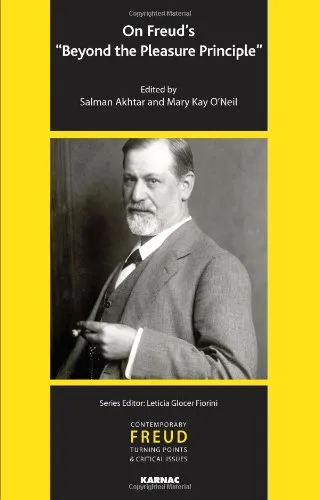On Freud's "Beyond the Pleasure Principle"
4.0
Reviews from our users

You Can Ask your questions from this book's AI after Login
Each download or ask from book AI costs 2 points. To earn more free points, please visit the Points Guide Page and complete some valuable actions.Welcome to a comprehensive exploration of "On Freud's 'Beyond the Pleasure Principle'," a critical text that delves into one of Sigmund Freud's most important yet enigmatic works. This book examines the profound insights Freud offers into human nature, psychological processes, and the intriguing notion that life isn't driven solely by the pursuit of pleasure.
Detailed Summary of the Book
Authored by Salman Akhtar and Mary Kay O'Neil, "On Freud's 'Beyond the Pleasure Principle'" serves as an insightful companion to Freud’s seminal work. Originally published in 1920, Freud's "Beyond the Pleasure Principle" introduces revolutionary concepts that challenge the traditional psychoanalytic focus on human behavior being driven mostly by pleasure-seeking motives. Freud posits the existence of a compulsion to repeat certain behaviors and introduces the concept of a death drive, which presupposes an instinctual inclination towards destruction and a return to an inanimate state.
This book provides a thorough analysis of Freud’s text, breaking down complex ideas into comprehensible parts. It contextualizes Freud’s theories within both his earlier body of work and subsequent psychoanalytic thought. Further, Akhtar and O'Neil explore the transformative implications of these concepts on psychoanalysis and psychological treatment methodologies. They examine historical and cultural contexts, allowing readers to appreciate how Freud’s ideas have permeated various disciplines and continued to provoke debate and discussion.
Key Takeaways
- The Pleasure Principle Challenged: Freud departs from the notion that human behavior is predominantly aimed at seeking pleasure and avoiding pain. Instead, he introduces complex drives that often act contrary to this principle.
- The Concept of the Death Drive: A revolutionary idea suggests an instinctual drive toward self-destruction and a return to a state of non-existence.
- The Compulsion to Repeat: Freud describes an unconscious drive whereby individuals repeat distressing life events, an inclination that does not align neatly with the pleasure principle.
- Influence on Psychoanalytic Theory: The book contextualizes how these ideas have significantly shaped modern psychoanalytic thought and practice, challenging previous understandings of human motivation.
Famous Quotes from the Book
Freud’s pioneering ideas, encapsulated in memorable quotes, continue to resonate:
"What appears in dreams, in active engagement with internal warfare and back edges which determine, in part, our behavioral repertoire, is not unambiguously a desire for pleasure."
"The interpretation of dreams is the royal road to a knowledge of the unconscious activities of the mind."
Why This Book Matters
"On Freud's 'Beyond the Pleasure Principle'" holds tremendous importance in the realm of psychoanalysis and psychology. By exploring one of Freud's most daring assertions, Akhtar and O'Neil guide readers through a complex landscape of human motivations and instincts. The ideas presented have crossed disciplinary boundaries, influencing fields such as philosophy, literature, and cultural studies.
The book serves as an essential resource for psychologists, therapists, and scholars who seek to understand the intricate motivations behind human behavior. It invites readers to re-evaluate preconceived notions about pleasure, compulsion, and instinct, urging them to consider the less tangible forces shaping our actions and psyche. This exploration is not only vital for professionals in mental health but also enriches the broader discourse on human nature and existential motives.
Free Direct Download
You Can Download this book after Login
Accessing books through legal platforms and public libraries not only supports the rights of authors and publishers but also contributes to the sustainability of reading culture. Before downloading, please take a moment to consider these options.
Find this book on other platforms:
WorldCat helps you find books in libraries worldwide.
See ratings, reviews, and discussions on Goodreads.
Find and buy rare or used books on AbeBooks.


